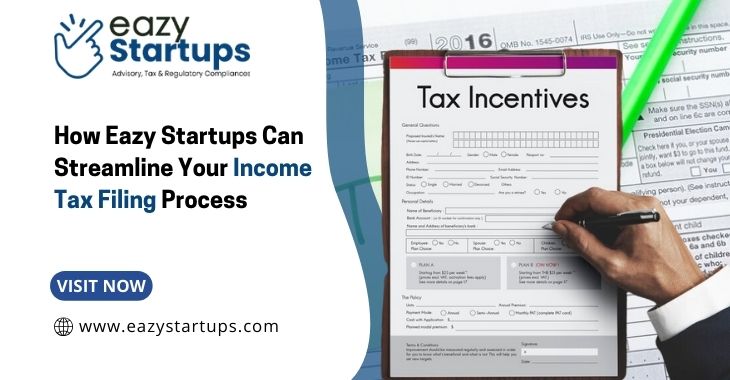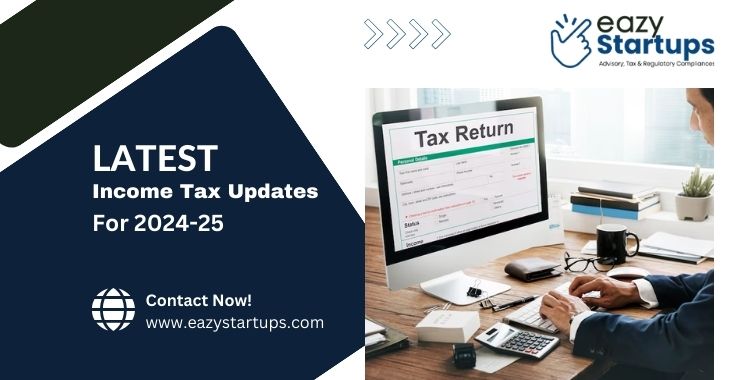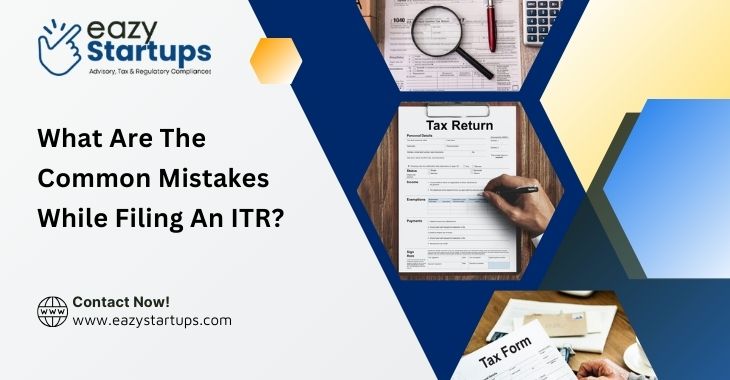In addition to being required by law, filing income tax returns (ITRs) is essential to a prudent financial plan. ITR filing has several benefits that improve your financial situation and open doors, even if some people see it as necessary. Here are seven strong arguments for why submitting income tax returns needs to be a key component of your overall financial strategy. If you want to apply for Income Tax Return Online, contact Eazy Startups for the best support and guidance.
Let’s discuss the points in detail:-
1. Adherence to the law and tranquility
2. Enables Access to Refunds
3. Unlocks Tax Benefits and Deductions
4. Facilitates Loan and Credit Approvals
5. Provides Proof of Income for a Range of Needs
6. Helps Avoid Penalties and Interest
7. Improves Wealth Management and Financial Planning
Adherence to the law and tranquility:
Businesses and individuals making more than a specific amount must file ITRs. Penalties, fines, or legal repercussions may result from noncompliance. In addition to following the law, timely return filing helps you avoid needless stress and guarantees that your financial transactions are open and legal.
Enables Access to Refunds:
Filing ITRs guarantees you can get a refund if you paid more tax than was necessary through advance tax or Tax Deducted at Source (TDS). This procedure is expedited, and the money you receive back can be used to increase your savings or put back into possibilities to increase your wealth. You lose all opportunity to recover this excess if you don’t file.
Unlocks Tax Benefits and Deductions:
You can claim deductions under several provisions of the Income Tax Act by filing your ITR. For example, you can lower your taxable income by investing in tax-saving products like insurance premiums, National Savings Certificates (NSC), and Public Provident Funds (PPF). You can reduce your tax burden and create a stable financial future by optimizing your deductions.
Facilitates Loan and Credit Approvals:
When evaluating loan applications for homes, cars, or personal necessities, lenders frequently look for ITR paperwork as evidence of income and stability of finances. Your credit profile is strengthened, and your prospects of obtaining loans on favorable terms are increased if you have a regular history of filing taxes. It is an essential step in preserving financial credibility.
Provides Proof of Income for a Range of Needs:
ITRs are a trustworthy way for self-employed people or people with several sources of income to verify their revenues. Your ITR enhances your eligibility and financial reputation by providing verifiable proof of income, whether you’re applying for a visa, renting a home, or participating in government tenders.
Helps Avoid Penalties and Interest:
Penalties, which might total thousands of rupees depending on delays, can be avoided by filing your ITRs on time. In addition, late filers frequently pay interest on unpaid taxes. You may save money and keep a spotless financial record by prioritizing timely tax filing.
Improves Wealth Management and Financial Planning:
Better financial knowledge and discipline are promoted by filing ITRs. When you prepare your taxes, you learn more about your income, expenses, and tax obligations. This method helps you build a stronger financial foundation for future security and prosperity by identifying areas for investment and savings optimization.
Conclusion
Not only is filing income tax returns required by law, but it’s also a wise financial decision with real advantages. Including tax filing in your financial plan is essential for long-term stability and growth, from wealth building and tax savings to legal compliance and financial credibility.
Make filing taxes a proactive aspect of your financial routine rather than waiting until the last minute. To guarantee accuracy and optimize your benefits, seek advice from a tax expert if you’re unsure about the procedure or require assistance. A financially secure future can be achieved by taking charge of your taxes now. If you want to apply for Income Tax Return Online, contact Eazy Startups for the best support and guidance.











Recent Comments